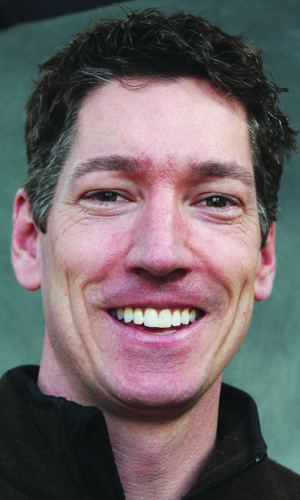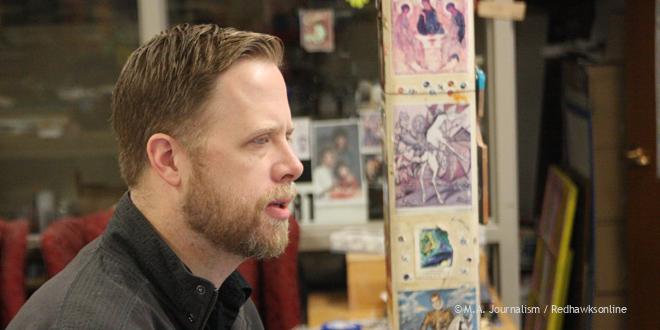Theater teacher and director Nicholas Freeman rested his chin against his knuckles and gazed across a room of empty chairs. After months of moments like these, Freeman was again thinking of the musical Godspell and his hopes for the coming production.
“From the show, in it of itself, I want [the audience] to learn more about God,” said Freeman, his voice echoing through the space of the conference room. “I want them to learn about how talented our community is. I want them to know that musical theater can be engaging and can speak to all sorts of different people.”
With the Minnehaha Players entering the first stages of rehearsals for the musical Godspell, which will be performed April 14, 15 and 16, Freeman hopes that the show will teach the community more about God and invoke discussion. Though this musical is an example of one that may not be considered controversial, many films, novels, plays and other forms of art have the potential to be immoral and contain topics that challenge the opinions of many Christians.
But, in the world today, what actually is considered art and why can it be so controversial?
“My definition of good art is: did it evoke an emotional response in you?” said Freeman.
In his eyes, even if viewing a play or seeing a painting evokes negative feelings in the viewer, the emotional response itself is what makes it good art.
Aside from causing an emotional reaction, good art can also express opinions, document stories, raise questions and invoke discussion. It takes the form of music, plays, films, novels, paintings, dancing, writing. No matter which of its forms, art plays a large role in society.

Theater teacher and director Nicholas Freeman shares his beliefs and discusses how he finds balance between faith and arts.
“Art is an extension of culture,” said art teacher Nathan Stromberg. “It’s the culture’s way of seeing the world and expressing what they feel. You can look throughout history and see the ways people have used society and religion and you can see it reflected in their art. Their values tend to come out through their art.”
Christians believe that the world is a fallen, sinful place. As it says in Galatians 5:19, “The acts of the flesh are obvious: sexual immorality, impurity and debauchery; idolatry and witchcraft; hatred, discord, jealousy, fits of rage, selfish ambition, dissensions, factions and envy; drunkenness, orgies, and the like.” These issues may sound familiar; they are often the topics of popular music, Broadway plays and blockbuster movies.
For Christians, the struggle to discern what art to engage in without letting the immoral values of the world become impactfull can occur constantly.
However, does refusing to see a certain play or movie that doesn’t match up with an individual’s beliefs lead to close-mindedness about the opinions of others?
“I think there is a point where seeing really horrible stuff does more harm than good,” Stromberg said. “But, I also think that to limit somebody’s ability to see something that may have difficult stuff in it maybe imposes a little bit of one viewpoint morality on top of another.”
Freeman points out that everyone has different boundaries for themselves.
Therefore, Christians seeking to engage in the world and still remain true to their values must find a balance between boundaries and participation in the arts.
Senior Bennett Pope argues that often works of art expressing controversial opinions or dealing with immoral topics can help strengthen individual’s beliefs.
“To some extent, it is good for you to encounter other opinions and other viewpoints,” said Pope. “But I think you need to filter that and say case by case, ‘Is this something that will make me a better person or is this something that could be of some harm and cause me to go against my moral and ethical beliefs?’ I don’t think choosing not to see something because it goes against your values is close minded or bad.”
Freeman agrees that as Christians, participation in the arts cannot be limited to the “squeaky clean” things.
“We can’t always do shows that are squeaky clean, because how are we deepening our faith?” he said. “How are we deepening our relationships with others if we are not talking about these topics? I think great art inspires discussion.”
“Squeaky clean” implies cleanliness in a way that means something that was once dirty, gritty, or edgy, but has been cleansed. In essence, Freeman is saying that it isn’t always good to remove any and all traces of profanity, issues of sexuality, violence and other immoral ideas from art. Through encountering some of these things, Christians can deepen relationships with those around them and with God.
Though there are many factors to weigh in the balance, Freeman believes that the key to engaging in arts that deal with immoral topics or ideals that don’t match up with Christian beliefs is discussion.
“The most important thing is to talk about it and to really reflect on ‘What is the intent of this piece?'” said Freeman. “If we, as a Christian community, can come together and see good art and talk about it, that makes us stronger people, and it forces us to truly understand what our foundation should be in, which is in Christ.”
Stromberg has also discovered that attempting to reconcile his Christian values and his love for the arts leads to great discussion and a deepening of his beliefs and faith in God.
“The Bible says [in Romans 12:2], ‘Do not let this world squeeze you into its mold but be renewed by the transforming of your mind,'” said Stromberg. “I think if we are allowing those messages to change the way we act and our motivations for things, then that’s unhealthy. I think that if we can look at it and it inspires thought and it causes us to contemplate bigger questions, then it’s ultimately really healthy too. We live in a big messed up world. There happens to be intense areas of beauty all around us, intense pockets of truth everywhere. I think it’s our constant duty to be absorbing what’s around us, and renewing our minds. But I don’t think it is so cut and dry as saying ‘That’s bad. That’s good.’ There’s all that gray in the middle. All those nuanced bits that we have to learn how to internalize and how to use.”

